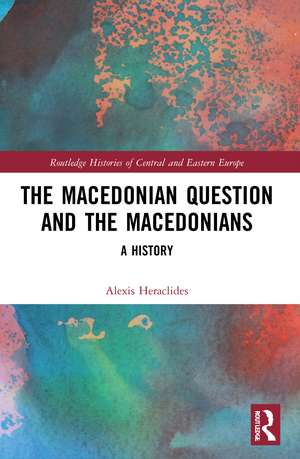The Macedonian Question and the Macedonians: A History: Routledge Histories of Central and Eastern Europe
Autor Alexis Heraclidesen Limba Engleză Paperback – aug 2022
The Macedonian Question was an offshoot of the wider Eastern Question – i.e., the fate of the European remnants of the Ottoman Empire once it dissolved. The initial protagonists of the Macedonian Question were Greece, Bulgaria and Serbia, and a Slav-speaking population inhabiting geographical Macedonia in search of its destiny, the largest segment of which ended up creating a new nation, comprising the Macedonians, something unacceptable to its three neighbours.
Alexis Heraclides analyses the shifting sands of the Macedonian Question and of the gradual rise of Macedonian nationhood, with special emphasis on the Greek, Bulgarian and Serbian claims to Macedonia (1870s–1919); the birth and vicissitudes of the most famous Macedonian revolutionary organization, the VM(O)RO, and of other organizations (1893–1940); the appearance and gradual establishment of the Macedonian nation from the 1890s until 1945; Titos’s crucial role in Macedonian nationhood-cum-federal status; the Greek-Macedonian name dispute (1991–2018), including the ‘skeletons in the cupboard’ – the deep-seated reasons rendering the clash intractable for decades; the final Greek-Macedonian settlement (the 2018 Prespa Agreement); the Bulgarian-Macedonian dispute (1950–today) and its ephemeral settlement in 2017; the issue of the Macedonian language; and the Macedonian national historical narrative. The author also addresses questions around who the ancient Macedonians were and the fascination with Alexander the Great. This monograph will be an essential resource for scholars working on Macedonian history, Balkan politics and conflict resolution.
| Toate formatele și edițiile | Preț | Express |
|---|---|---|
| Paperback (1) | 253.64 lei 6-8 săpt. | |
| Taylor & Francis – aug 2022 | 253.64 lei 6-8 săpt. | |
| Hardback (1) | 1003.30 lei 6-8 săpt. | |
| Taylor & Francis – 31 dec 2020 | 1003.30 lei 6-8 săpt. |
Din seria Routledge Histories of Central and Eastern Europe
-
 Preț: 311.41 lei
Preț: 311.41 lei -
 Preț: 311.90 lei
Preț: 311.90 lei - 8%
 Preț: 382.96 lei
Preț: 382.96 lei -
 Preț: 310.55 lei
Preț: 310.55 lei - 9%
 Preț: 868.44 lei
Preț: 868.44 lei -
 Preț: 311.48 lei
Preț: 311.48 lei -
 Preț: 310.22 lei
Preț: 310.22 lei -
 Preț: 310.84 lei
Preț: 310.84 lei -
 Preț: 310.99 lei
Preț: 310.99 lei -
 Preț: 389.66 lei
Preț: 389.66 lei -
 Preț: 310.22 lei
Preț: 310.22 lei -
 Preț: 310.84 lei
Preț: 310.84 lei -
 Preț: 163.03 lei
Preț: 163.03 lei - 18%
 Preț: 1000.27 lei
Preț: 1000.27 lei -
 Preț: 309.79 lei
Preț: 309.79 lei - 18%
 Preț: 1000.27 lei
Preț: 1000.27 lei - 16%
 Preț: 264.98 lei
Preț: 264.98 lei - 18%
 Preț: 1006.77 lei
Preț: 1006.77 lei -
 Preț: 385.47 lei
Preț: 385.47 lei - 18%
 Preț: 1001.39 lei
Preț: 1001.39 lei - 18%
 Preț: 1000.27 lei
Preț: 1000.27 lei - 18%
 Preț: 887.43 lei
Preț: 887.43 lei -
 Preț: 387.49 lei
Preț: 387.49 lei - 18%
 Preț: 1001.90 lei
Preț: 1001.90 lei -
 Preț: 389.66 lei
Preț: 389.66 lei - 18%
 Preț: 1006.43 lei
Preț: 1006.43 lei - 18%
 Preț: 1109.18 lei
Preț: 1109.18 lei - 19%
 Preț: 269.84 lei
Preț: 269.84 lei -
 Preț: 311.41 lei
Preț: 311.41 lei - 18%
 Preț: 1003.30 lei
Preț: 1003.30 lei - 18%
 Preț: 1000.27 lei
Preț: 1000.27 lei - 18%
 Preț: 1006.77 lei
Preț: 1006.77 lei - 17%
 Preț: 259.72 lei
Preț: 259.72 lei -
 Preț: 391.02 lei
Preț: 391.02 lei
Preț: 253.64 lei
Preț vechi: 308.10 lei
-18% Nou
Puncte Express: 380
Preț estimativ în valută:
48.54€ • 50.91$ • 40.40£
48.54€ • 50.91$ • 40.40£
Carte tipărită la comandă
Livrare economică 01-15 aprilie
Preluare comenzi: 021 569.72.76
Specificații
ISBN-13: 9780367653521
ISBN-10: 0367653524
Pagini: 292
Ilustrații: 1
Dimensiuni: 156 x 234 x 19 mm
Greutate: 0.14 kg
Ediția:1
Editura: Taylor & Francis
Colecția Routledge
Seria Routledge Histories of Central and Eastern Europe
Locul publicării:Oxford, United Kingdom
ISBN-10: 0367653524
Pagini: 292
Ilustrații: 1
Dimensiuni: 156 x 234 x 19 mm
Greutate: 0.14 kg
Ediția:1
Editura: Taylor & Francis
Colecția Routledge
Seria Routledge Histories of Central and Eastern Europe
Locul publicării:Oxford, United Kingdom
Public țintă
PostgraduateCuprins
Preface, 1. Greek, Bulgarian and Serbian Claims to Macedonia; 2. The War of Ethnographic Maps; 3. The VM(O)RO & Other Macedonian Organizations (1893-1940); 4. Tracing the Birth of a Balkan Nation; 5. Tito and the Macedonians; 6. The ‘New Macedonian Question’: The Greek-Macedonian dispute; 7. Bulgaria’s Stance Towards Macedonia; 8. The Macedonian Language; 9. The Macedonian National Historical Narrative; 10. The Charm of Alexander the Great: Who Were the Ancient Macedonians?; 11. The Crux of the Greek-Macedonian Dispute: The Skeletons in the Cupboard; 12. The Settlement of the Greek-Macedonian Dispute: the Prespa Agreement; 13. The Ephemeral Macedonian-Bulgarian Rapprochement; Select Bibliography
Notă biografică
Alexis Heraclides is Emeritus Professor of International Relations and Conflict Resolution at the Panteion University of Social and Political Sciences (Athens) and author of several books on self-determination, secession, the CSCE, humanitarian intervention, the Middle East conflict, the Cyprus Problem, the Greek-Turkish antagonism with emphasis on the Aegean dispute, the Macedonian Question and others.
Descriere
This book is a comprehensive and dispassionate analysis of the intriguing Macedonian Question from 1878 until 1949 and of the Macedonians (and of their neighbours) from the 1890s until today, with the two themes intertwining, and will be a key resource for scholars working on Macedonian history, Balkan politics and conflict resolution.
